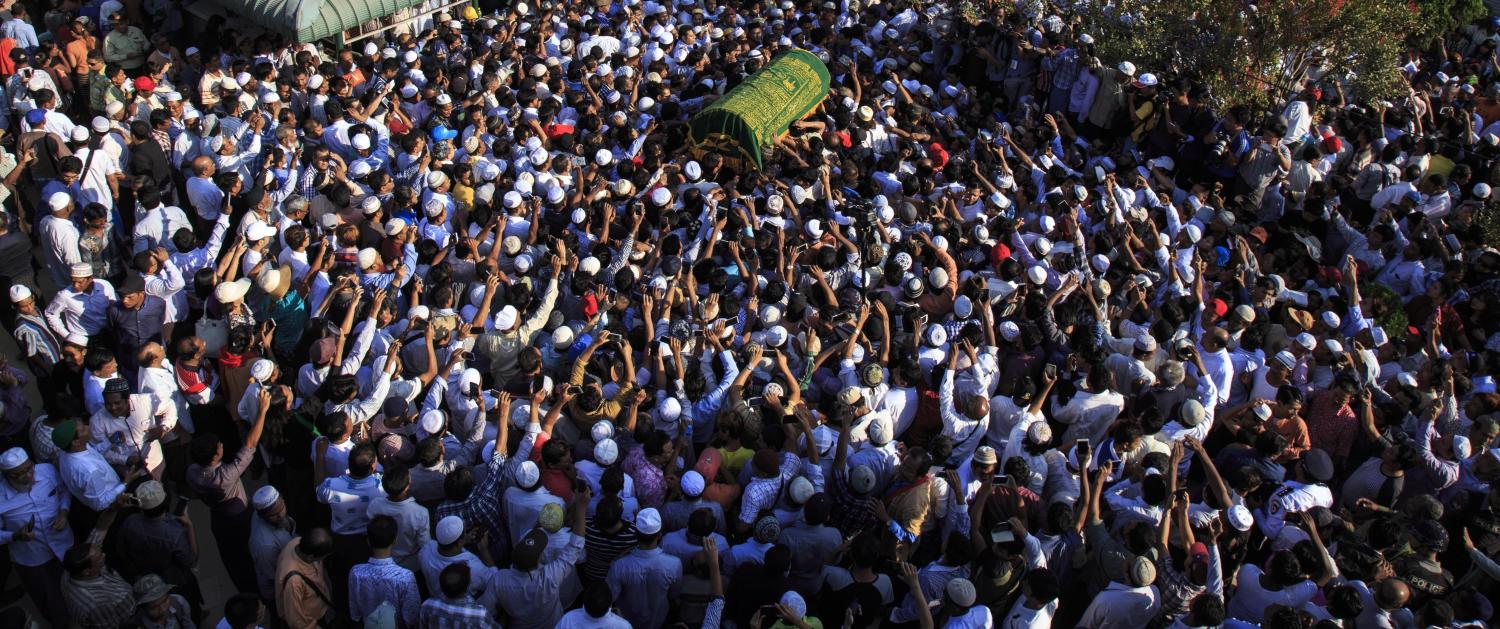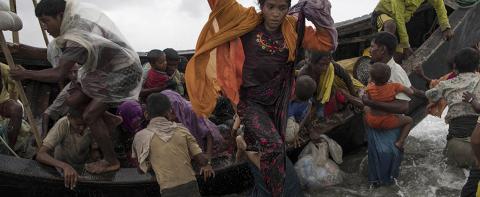A day after the assassination of U Ko Ni, the long-serving adviser to Aung San Suu Kyi and tireless champion for the rule of law and an inclusive, democratic Myanmar, outside Myanmar’s busiest airport, thousands of people – Buddhist, Muslim, and Christian – gathered at Yay Way Cemetery, a Muslim cemetery in Yangon, for his funeral. The congregation of peoples of all faiths attending was a brief moment of hope amid the deteriorating state of crisis across the country.
A day after the murder, an official addressing the crowd gathered outside U Ko Ni's house in Yangon requested that 'cars headed to the funeral must obey traffic rules. U Ko Ni did not like people breaking the rules. Please respect that.' U Ko Ni was, in many ways, a symbol of Myanmar’s progress. One of the country’s most prominent Muslims, he was an indefatigable advocate for the developing rule of law and a key legal adviser for Aung San Suu Kyi’s government.
Little is yet known about the assassin’s motive, but the alleged gunman, 53-year-old lawyer U Kyi Lin, was arrested at the scene (an eye-witness account is here). The Myanmar Times reported that Kyi Lin was in 2001 sentenced to 27 years in jail for stealing pagoda property but was released in 2014 following a Presidential amnesty. Some on social media have noted reports the gunman was apprehended by a crowd of taxi drivers rather than police or airport security. If true, it raises concerns about the security of key public spaces in Yangon and around Myanmar.
In a country so familiar with bloodshed and civil war, gruesome footage of a bloodied U Ko Ni lying outside the Yangon International Airport circulated on Facebook. A photo captured the seconds before the murder: an unsuspecting U Ko Ni holding his infant grandson as a gunman in shorts and sandals steadies a pistol an inch from the back of his head.
The murder seemed to be played down by the state-run Global New Light of Myanmar, despite the gravity of the assassination and in contrast to the nation's other dailies. A report ran on page three on Monday, an earlier edition of the paper had the article on the front page. The NLD government, no doubt in a state of shock, appeared not to know how to immediately handle the assassination.
U Ko Ni was a resolute campaigner for changing the constitution, drafted by the Myanmar armed forces to maintain the military's power in the country and force the elected NLD government into a power-sharing arrangement. In April 2016 he expressed his frustration at this state of affairs, saying the NLD was 'wasting time trying to amend' the constitution suggesting that 'writing a new one is the best way to pursue a democratic constitution'. It was a bold statement that spoke volumes for his conviction in a democratic and pluralistic Myanmar. His assassination weakens the NLD’s hand in constitutional change. Amendments will be crucial if the promises of Myanmar’s peace process - which include a negotiated political agreement with ethnic armed groups on a federal system - are to be fulfilled.
U Ko Ni was also an outspoken critic in other affairs. He believed that Ministry of Home Affairs control of the General Administration Department (the all-important public service that controls many aspects of Myanmar life) should be reformed. Indeed, while the military and the NLD were locked in a delicate power-sharing arrangement, he was a vocal advocate on the reforms needed for peaceful and inclusive democracy in the country.
U Ko Ni’s convictions for a pluralistic and forward looking country extended to his advocacy of Muslims in the country. A Burmese Muslim (not Rohingya Muslim, as some articles have insinuated), his faith was quietly observed. He was pragmatic and thoughtful in his endeavours to foster democracy, religious harmony and social inclusion.
He was a critical voice within the NLD when it did not field Muslim candidates in the 2015 elections in a bid to placate Buddhist hardliners. But, passionate and pragmatic toward the democratic transition, U Ko Ni later told Al Jazeera that 'in this situation, if we chose Muslim candidates there might have been some problems'. In June last year, he helped found the controversial Myanmar Muslim Lawyers Association. He patiently deliberated on the legal foundations for a democratic society inclusive of all peoples in Myanmar.
As a progressive thinker and prominent Muslim, he was often the subject of hate speech and discrimination. U Ko Ni’s daughter, Yin Nwe Khine, told Reuters 'my father was often threatened and we were warned to be careful, but my father didn't accept that easily. He always did what he thought was right...a lot of people hate us because we have different religious beliefs'.
The assassination is the latest in a string of events that demonstrate the worsening prospects for Myanmar’s democratic transition. The faltering political dialogue with ethnic armed groups, the renewed fighting in northern Myanmar, the worsening humanitarian situation in Rakhine state - bad enough in isolation but made worse by a spluttering economy and stalled reforms - are all symptoms of a government divided.
More immediately, the assassination demonstrates that senior NLD figures aren’t out of reach of those that wish them harm; indeed, copycat actors may now elevate this threat. With emotions running high, the NLD announced it would increase security measures – this should have been done earlier for all senior public officials. In August, an 'IS hit-list' sent to a Malaysian police station included the State Counsellor. Interfaith tensions in Myanmar have never been higher. Following the assassination of U Ko Ni, reprisal attacks on Buddhist figures or religious sites should a major concern of the state security apparatus.
U Ko Ni’s death need not be in vain; it should be a wake-up call to the deepening societal divisions across the country. It could, in fact, be the powerful catalyst that pulls Myanmar from the brink of further divisions. That would be the most fitting way to honour him.

